- Home
- Keith R. A. DeCandido
Honor Bound Page 2
Honor Bound Read online
Page 2
“We go into battle to preserve the honor of our Empire, Commander,” he said, making it clear that an elevation in rank went with the elevation in position, prompting a grin from Yivogh. “You will know more when the time is right.”
“As you command, sir.”
K’Vada nodded, and leaned back in his chair. Not a bad morning, he thought. First what appeared to be a call to glory. Then he rid himself of his burdensome first officer—which, judging by the crew’s reaction, would serve only to solidify his own position as captain. Yivogh might have had ambitions of his own, of course, and he was as likely as not to view the peculiar nature of this mission as an opportunity for advancement, much as his predecessor had.
For now, however, he is grateful to me, and I will use that for as long as I may. And then, Klag, we shall see if your call to glory is true….
Bekk Maris sat in his new bunk on the Gorkon, reading Warriors of the Deep Winter, the latest novel by K’Ratak. It was disappointing. There was a time when a new release from the novelist was a cause for celebration. Maris still remembered the day that The Vision of Judgment, the long-awaited sequel to The Dream of Fire, was released. He had arranged to have no duties to perform on that day, and spent all of it reading the new book. He finished it that day, and reread it, but it had not been the transcendent experience that the first one had been. Now, six books later, Maris was forced to admit that The Dream of Fire was not just K’Ratak’s greatest work, but his only good one. The author was, in Maris’s considered opinion, coasting on the reputation of that one bit of genius.
Maris wasn’t the only one who felt that way. An irate reader had met K’Ratak at a public appearance and challenged him, saying he was no longer worthy of his accolades. However, to the irritation of many dissatisfied readers, K’Ratak won the duel handily, and no one had dared challenge him since.
Looking up from his reading, Maris surveyed his new surroundings. In truth, they were no different from his old surroundings: a bunk, two meters in length, one meter in width, and half a meter in height, the same as assigned to each of the fifteen hundred soldiers on theGorkon. The difference was that he was now in the top bunk belonging to Fifteenth Squad instead of the middle one belonging to the seventh.
It had all begun last night when he returned from dinner to find that his belongings had been removed.
“You’re in the wrong place, Bekk.”
Maris had turned to see Avok, the Leader of the seventh. As usual, the Leader’s hair was flying in all directions, his beard untended, with bits of the evening meal’s bok-rat liver amid the hairs.
“What’s going on, Avok?”
“It seems that the entire eighteenth has been promoted to the seventh. QaS DevwI’ Vok was impressed with their performance during the initial attack on San-Tarah.”
Scowling, Maris said, “The entire eighteenth? All four?” Avok nodded. “But what of me? And Trant?” The other two members of the seventh had been killed during one of the contests against the San-Tarah.
“According to Lieutenant Lokor, you’ve both been transferred to fill the two spots in the fifteenth.”
Angrily, Maris asked, “Why have we been demoted?” Maris knew that the fifteenth, too, had lost a pair of soldiers to the San-Tarah, but that didn’t explain why the ranks were being filled with superior soldiers. A post on one of the finest new warships in the fleet was a great honor, as was an assignment to the seventh. The Gorkon had three hundred five-soldier squads, and to be among the first fifteen of those—under the general command of QaS DevwI’ Vok—was a great privilege. To have that privilege—well, not revoked as such, but at least diminished did not sit at all well with Maris.
Avok smiled, showing a mouth full of gaps between too-rare instances of teeth. “You’ll have to ask Lieutenant Lokor. I just do what they tell me.”
That’s always Avok’s excuse, Maris thought. Aloud, he simply said, “I see.”
“Leader Wol is waiting for you at the fifteenth’s bunks.”
Oh no. Oh no no no. Now it all made sense to Maris.
Before their arrival at San-Tarah, Trant and Maris had gotten into a fight. Maris couldn’t even remember what it was about—they were both just aggravated by the enforced inactivity of nine weeks of useless exploration of the Kavrot Sector. The second officer, Lieutenant Toq, had broken up the fight, along with Leader Wol of the fifteenth. Wol had convinced Toq not to report their brawl to the QaS DevwI’ or to Lokor, for which Maris, at least, was grateful, but Toq’s price for that was to make Maris and Trant’s subsequent behavior Wol’s responsibility.
It seems that it is to be taken literally now. Resigned to the inevitable, Maris made his way to the fifteenth’s bunks.
Without thinking, he got into the middle bunk, assuming that he would occupy the same spot. However, the quartermaster had either not bothered to keep the same alignment, or simply didn’t care. When Maris went to retrieve his personal padd, he found that they had put Trant’s belongings in the middle bunk.
A few minutes later, Maris climbed to the topmost bunk, and found his own items there.
After a night’s sleep, he awoke and tried to finish off Warriors when he heard footsteps approaching. He looked up to see Trant, walking stiffly. “I see that B’Oraq has finally freed you from your prison.”
Trant’s legs had been shredded by one of the alien creatures on the planet below. They appeared to have healed, but B’Oraq had, typically, insisted he remain in the medical bay overnight, as if a biobed were a proper place for a soldier. Trant was as proud a warrior as you could find, and might have made a fine officer. Apparently, though, his way was blocked. When they were assigned to the Gorkon together months ago, Trant had told Maris: “The sons of petty criminals do not become officers.”
“Yes,” he said now in reply to Maris’s comment. “Our yIntagh of a doctor warned me that I would have ‘difficulty’ walking. She also said she was going to recommend I remain shipboard for the time being.” He scowled. “I believe she meant that as a joke.”
Maris grinned. “It is hard to tell with her. She learned medicine in the Federation, remember—I believe she has picked up their peculiar sense of humor.”
“Perhaps.” He gazed dolefully at the bunks. “Lieutenant Toq had better hope that we do not encounter each other away from prying eyes.”
Maris barked a laugh. “Speak a little louder, fool. Perhaps Lokor will hear you and kill you once and for all.”
Another voice said, “Lokor wouldn’t waste his time on such sputum as yourselves.”
Looking past Trant, Maris saw Leader Wol approaching the bunk area, along with G’joth, an old bekk with waist-length white hair and a horn-shaped beard, and the infamous Bekk Goran, by far the largest and strongest Klingon on the Gorkon—and, perhaps, in the Defense Force. He towered over the other two by a full head.
“And he won’t need to,” Wol said. “Because I will kill you long before he even has the chance to if given the slightest provocation. You were assigned to the fifteenth because I requested it. Toq made me responsible for you, and I take my responsibilities very seriously.”
“This is madness!” Trant spit on the deck. “We are warriors of the seventh. To be sent to the fifteenth is—”
“Fitting.” Wol smiled nastily as she said it. At least this Leader has all her teeth, Maris thought with amusement.
“I disagree,” G’joth said. “I was hoping for worthy replacements for Davok and Krevor, not these two petaQ.”
Trant advanced on the bekk. “You dare!”
Goran also advanced, his massive form looming over Trant. “If you touch my friend G’joth, I will break you in two, Trant.”
Trant ceased his advance. Goran had held a super-dense koltanium rock on his back for over seven hours on San-Tarah. He truly could break Trant into two separate pieces if he put his mind to it, and Maris was glad to see that his comrade wasn’t foolish enough to put that to the test.
“This is Bekk G’joth,” Wol sa
id, indicating the white-haired man, “and this is Bekk Goran. They are part of the fifteenth. If you’re lucky, Trant, you and Maris will live long enough to understand what that means.”
“If we’re lucky,” G’joth added, “you won’t.”
With a sneer, Trant said, “I already know what it means, G’joth—that we are being punished for nothing!”
Wol moved in close enough so that her nose was almost touching Trant’s crest. “Oh no, Trant. Not nothing. After your pathetic display near the armory last week, you could very easily have been demoted to the three hundredth and given waste-extraction duty. Instead, you have been given a chance at redemption.”
“With you?” Again, Trant sneered.
“We held the road at the San-Tarah’s Prime Village. We defended the prize in the third contest. Davok and Krevor died with honor. You and Maris have a chance to be a part of that—or you can die a fool’s death. The choice is yours. But make it quickly—because if you are to prove worthy, I want to know, and if you aren’t I want you dead so we can put someone more deserving in your place.”
With that, Wol turned her back on Trant and walked away. Goran and G’joth followed her, also with their backs to him.
Maris laughed. “You should’ve just gotten into your bunk and kept your mouth shut. It worked for me.”
Trant said nothing in response.
The Ruling Pack surrounded Klag, lying on their stomachs in a circle inside what they called their Meeting Hut. The walls of the hut were decorated with the heads of san-reak—massive game animals that lived on a distant island. Once a year, shortly before winter, selected members of the Children of San-Tarah hunted this animal, one of which was enough to feed the populace for the entire cold season. The heads—which by themselves were almost larger than a Klingon child—were mounted on the walls as trophies of Great Hunts past.
All fourteen members of the Ruling Pack lay before Klag. The colors of the fur that covered each of the be-snouted bipeds ranged from as white as the snow on Rura Penthe to as black as space, with several variations of brown, gray, and dark red in between. They wore no clothing—their fur was more than adequate protection from the elements, and until Klag’s first ground troops beamed to the surface a week ago, they had not known of the concept of body armor. Though it was sometimes difficult to read alien species, Klag was quite certain that they were each looking upon him with a combination of anger and confusion.
Klag had requested the audience with Me-Larr after sending out the call to the Order. Talak’s fleet would not arrive for five days. Klag had no idea what results he would get from his summons, if any, but in the meantime, he owed it to Me-Larr’s people to inform them of what had happened.
Me-Larr had been angry when Klag transported down, since the captain had sworn an oath not to set foot on San-Tarah again, but that display was as nothing compared with the fury he exhibited when Klag finished telling the story of Talak’s betrayal of Klingon honor. He rose and began to pace the length of the hut. The other members of the Ruling Pack seemed equally restless, but remained in their prone state.
“You told me, Captain Klag, that no true Klingon would betray your word of honor. You told me that your people valued honor above all else. Was that a lie?”
“No. It was, however, a mistake.”
“A mistake?” Me-Larr’s eyes burned with fury; saliva dripped from his teeth. “You said it was the most important tenet of your people!”
“We are not a monolithic species, Me-Larr. We aspire to certain ideals, laid down by Kahless fifteen hundred years ago. It is, however, much easier to aspire than achieve. General Talak has had more difficulty making that journey than I had previously thought.”
Te-Run, the oldest and wisest of the Ruling Pack, said, “Then the events of the past few days were for naught. We are to be conquered.”
“Not if I have anything to say about it,” Klag said. “The Gorkon will defend your world to the last dying breath of each warrior on board. General Talak may be willing to turn his back on honor, but I will not.”
Another of the Ruling Pack—Ga-Tror, whom Klag knew was their Fight Leader—said, “How many of these ships does General Talak command?”
Technically, as Chancellor Martok’s chief of staff, he commanded all of them, but Klag saw no reason to get into that. “His present fleet numbers twelve, possibly thirteen, but they will not all be sent here. Even so, there will be at least two ships and possibly more that are the equal of the Gorkon.”
Over the days, Klag had begun to get a grasp of the San-Tarah’s body language, so he knew that Ga-Tror’s turning his eyes away from Klag now was a decided insult. “Then your defense of our planet would seem to be lacking, Captain Klag.”
For his part, Klag looked right at the Fight Leader. “If I were alone, that would be so, but I am not. Even now, ships from throughout the Klingon Empire are wending their way to this star system to come to our aid.” Strictly speaking, he did not know this for sure, but he needed to reassure them that his fight on their behalf would be more than a suicidal gesture—even though it may well be that in the end, he thought bitterly. “We have also been studying the subspace eddies.”
“This is what blocks the stars from our view?” another of the Pack asked.
“Yes. We have begun to find ways to make our weapons and other tools work properly amidst the eddies, and this is not intelligence we will share with our enemies.” He looked at each member of the Ruling Pack one by one as he spoke, finally resting his eyes on Me-Larr. “The road to victory will not be an easy one. But I swear to you that the road will be paved with the blood of the honorless cowards who would betray everything that has made the Klingon Empire great. I know you to be among the finest warriors I have ever seen. Those who serve under me have sworn to die defending your planet. I ask now that you join us in doing so. Talak will send troops to the surface—you must be ready for them.”
“You can be assured that we will be.” The fury had not left Me-Larr’s voice. “I told you that we would not surrender to invaders, and we still will not. If this General Talak is to take San-Tarah from us, he must pry it from our dead claws.”
Klag smiled. “Good. As I said, you will not be alone. I wish to send our own ground troops down, to fight alongside your people against the troops Talak will send. He will not be prepared for fighters of your caliber, nor for Klingon warriors who have honor on their side.”
The head of the Ruling Pack went to one corner of the Hut. One of the San-Tarah’s odd two-bladed swords hung from a strap on the wall. The blade curved sharply, first angling out from the hilt and then around into a deep crescent. The blade split in two, one going straight upward, the other continuing to form the rest of the crescent. Each blade ended in a V formation. It was with just such a sword that Me-Larr had defeated Klag—armed with a bat’leth—in the final contest just a day ago.
Me-Larr turned to the other members of the Ruling Pack. “Spread the word to all the villages that we must go to arms. For many seasons we have lived for fighting. Now we must fight to live.” He held the sword aloft. “Our foes will fall before us!”
All the Ruling Pack—save for Me-Larr and Te-Run—howled their approval. The sound pierced the air, and they howled in such perfect harmony that the metals in Klag’s uniform seemed to vibrate.
Then the dozen members of the Pack who had howled departed to carry out Me-Larr’s instructions, leaving Klag alone with Me-Larr and Te-Run.
After a moment of silence, Te-Run spoke softly. “I knew that this day would come, but never did I believe it would come so soon—nor that it would come from your people, Captain Klag.”
“Neither did I, Te-Run,” Klag said honestly. “In truth, I am still amazed that this is happening. I have watched the message that Talak sent me informing me of his intentions many times, yet I cannot believe that it is a Klingon general speaking. I had thought the days of such honorless, cowardly behavior to be behind us as a people.”
Me-Lar
r put his sword back on the wall. “You were obviously mistaken.”
“Yes. With your permission, Me-Larr, I will begin transporting troops to the surface. They will begin instructing your own warriors in how best to combat our ground troops.”
Baring his teeth, Me-Larr said, “That won’t be necessary. If you recall, we had little trouble dealing with your ground troops when they first arrived.”
Klag scowled. “This time it will be different. Talak is likely to send more than a hundred troops in the initial attack, and he is also aware of your capabilities.”
“How is that?” Te-Run asked sharply. “You said you would share no intelligence with the enemy.”
“Talak has our initial reports. I sent him records of our encounters to date when I first informed him of this planet, shortly after the final contest. I did not know then what his reaction would be. He is my commanding officer. Until I received his own obscene orders, I had no reason to mistrust him. So he knows of your capabilities, your passion, your fire. That gives him an advantage that the Gorkon soldiers did not have a week ago. So we must give you a further advantage.”
“Very well.” Me-Larr seemed very reluctant to concede the point, for which Klag couldn’t really blame him.
“Worry not, Me-Larr—I will not allow your world to be taken from you without a fight.”
Me-Larr nodded. “I do worry, Captain Klag—but not about that. I am responsible for my people, and I fear that I may have led them into ruin.”
“You’ve done no such thing,” Te-Run said snappishly. “If anything, you’ve given us the best hope we have for survival. Imagine if General Talak had come instead of Captain Klag here. He would not have accepted our challenge, and they quite likely would have destroyed us all. Now we have an ally in our fight, and one who knows the foe better than we do.” She cradled Me-Larr’s snout in one claw. “Either way, Me-Larr, you are leading us to the greatest battle the Children of San-Tarah have ever seen. Win or lose, you have guaranteed that yours will be the story most told by future generations.”

 Alien
Alien Miracle Workers
Miracle Workers Articles of the Federation
Articles of the Federation Supernatural Heart of the Dragon
Supernatural Heart of the Dragon War Stories: Book Two
War Stories: Book Two The Zoo Job
The Zoo Job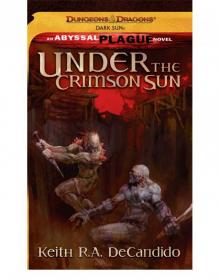 Under the Crimson Sun
Under the Crimson Sun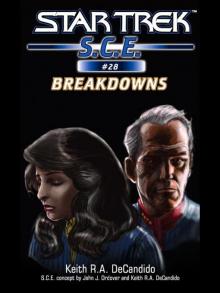 Breakdowns
Breakdowns Mermaid Precinct (ARC)
Mermaid Precinct (ARC) Supernatural 1 - Nevermore
Supernatural 1 - Nevermore STAR TREK - The Brave and the Bold Book One
STAR TREK - The Brave and the Bold Book One Four Walls
Four Walls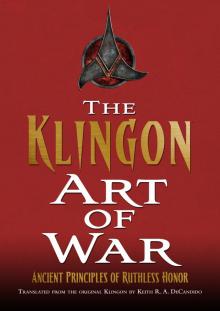 The Klingon Art of War
The Klingon Art of War Blackout
Blackout War Stories: Book One
War Stories: Book One The Brave and the Bold Book Two
The Brave and the Bold Book Two Honor Bound
Honor Bound Sleepy Hollow: Children of the Revolution
Sleepy Hollow: Children of the Revolution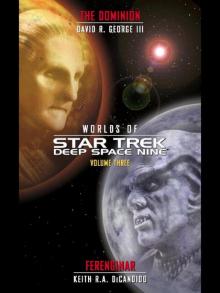 Worlds of Star Trek Deep Space Nine® Volume Three
Worlds of Star Trek Deep Space Nine® Volume Three Star Trek: TNG: Enterprises of Great Pitch and Moment
Star Trek: TNG: Enterprises of Great Pitch and Moment Genesis
Genesis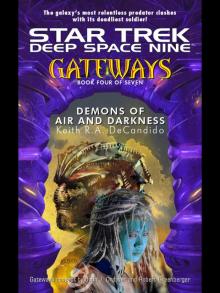 Demons of Air and Darkness
Demons of Air and Darkness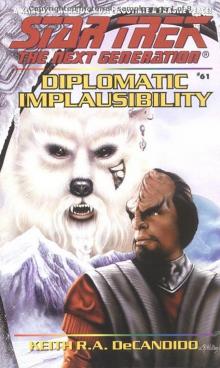 Star Trek - TNG - 61 - Diplomatic Implausibility
Star Trek - TNG - 61 - Diplomatic Implausibility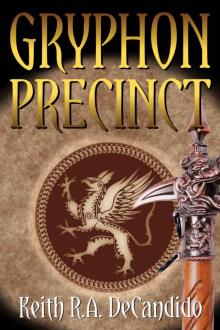 Gryphon Precinct (Dragon Precinct)
Gryphon Precinct (Dragon Precinct)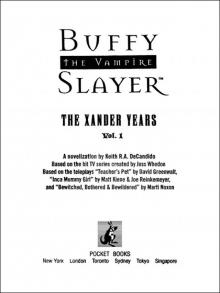 THE XANDER YEARS, Vol. 1
THE XANDER YEARS, Vol. 1 Nevermore
Nevermore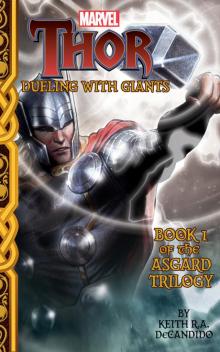 Thor
Thor The Brave And The Bold Book One
The Brave And The Bold Book One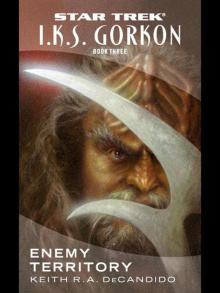 I.K.S. Gorkon Book Three
I.K.S. Gorkon Book Three STARGATE SG-1: Kali's Wrath (SG1-28)
STARGATE SG-1: Kali's Wrath (SG1-28) Bone Key
Bone Key Guilt in Innocece
Guilt in Innocece Star Trek - DS9 Relaunch 04 - Gateways - 4 of 7 - Demons Of Air And Darkness
Star Trek - DS9 Relaunch 04 - Gateways - 4 of 7 - Demons Of Air And Darkness The Art of the Impossible
The Art of the Impossible I.K.S. Gorkon Book One: A Good Day to Die
I.K.S. Gorkon Book One: A Good Day to Die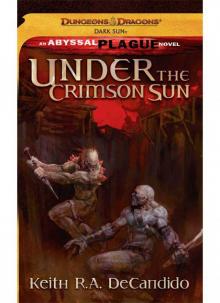 Under the Crimson Sun (the abyssal plague)
Under the Crimson Sun (the abyssal plague)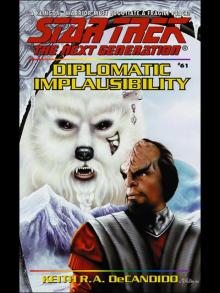 DIPLOMATIC IMPLAUSIBILITY
DIPLOMATIC IMPLAUSIBILITY Tales from the Captain's Table
Tales from the Captain's Table A Burning House
A Burning House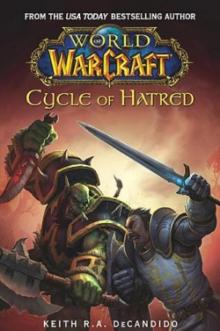 Cycle of Hatred (world of warcraft)
Cycle of Hatred (world of warcraft) Have Tech, Will Travel
Have Tech, Will Travel Security
Security